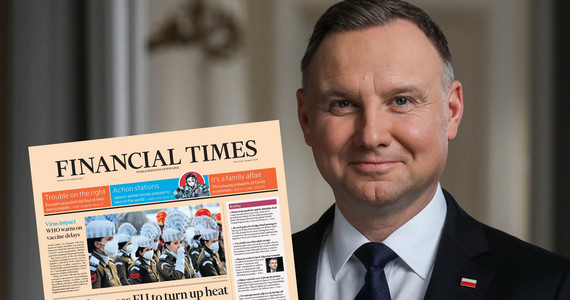The European Union’s foreign ministers are due to discuss the European Union’s response to Navalny’s prison on Monday. According to President Duda, the talks on imposing further sanctions will be “fully justified”, given both Navalny’s treatment and Russia’s continued participation in the unresolved disputes in Georgia and Ukraine. He also said that the European Union’s High Representative for Foreign Affairs Josep Borrell should reconsider his plans to visit Moscow next month.
“There is no other peaceful tool to exert pressure on a country that violates the rules of international law. The primacy of international law is essential here. As long as international law is respected, there is no war. And in the event that international law is violated, the result is always conflict” – said Duda.
“The only way (to avoid conflict) is to apply international law. The only way to do that without rifles, cannons and grenades is through sanctions. So we are ready to help build consensus on this issue,” he stressed.
Mass protests in Russia
On Saturday, there were protests in Russia against the arrest of Navalny, who was arrested on January 17 upon his return from Germany, where he was treated after trying to poison him with the combat agent of Novichuk. During the Saturday protests, more than 3.5 thousand people were arrested. People.
Duda said one way to increase pressure on the Kremlin would be to punish the Russian gas giant, Gazprom. – I think that if we limit Gazprom’s ability to operate economically on the territory of the European Union, especially with regard to making new investments, matters related to respect for international law as well as human and political rights in Russia will start to move forward, because he said it would be a serious step in economic interests Russian.
Europe is divided over Russia
As the Financial Times notes, while some other European Union countries, particularly the three Baltic states, share Poland’s hard-line stance, the bloc is deeply divided on policy toward the Kremlin. But the crackdown on protesters increased the stakes for Monday’s talks between foreign ministers. The European Union has already imposed sanctions on six senior Russian officials for their alleged involvement in Navalny’s assassination attempt. The newspaper said: “The European Union may go towards more sanctions that target individuals or specific institutions, but more comprehensive measures – such as those imposed after Moscow’s annexation of the Crimea peninsula – are likely to stir up disputes.”
Duda said Borrell’s planned visit to Moscow in February would be a mistake if “the condition of his visit is not to release Navalny.” “Without it, in my opinion, there is nothing to talk about,” he said. Russia is not a country that can be trusted and does not share the same values and goals in terms of democratic principles as the Euro-Atlantic countries. This is a different country. It is a country that has shown for years that its imperial ambitions are back, ”the Polish president emphasized.
And as the Financial Times reports, Poland has long considered close ties with the United States a key element in the defense against the Kremlin’s renewed ambitions. During the presidency of Donald Trump, with whom Duda had a close relationship, Warsaw signed billions of dollars in contracts to purchase American military equipment, and Trump announced the transfer of a thousand additional soldiers and the forward command of the US Fifth Corps. To Poland.
Polish-American relations
The paper notes that the initial relationship with the Biden administration was less extravagant. During the election campaign, Biden spoke of “the growth of totalitarian regimes in the world”, mentioning Poland after Belarus, while Doda, unlike other European leaders, mentioned Biden did not congratulate him on his victoryUntil it is confirmed by the Electoral College, six weeks after the election.
In an interview with the Financial Times, Andrzej Duda argued that relations between Warsaw and Washington were “too important” to be made dependent on a single “note or gesture”, and that it would be “premature” to congratulate the media on the media’s decision to announce the results.
The president said he hoped The close relations between the United States and Poland will continue under the new administrationBiden will continue his engagement policy in Central Europe.
Duda indicated that during the era of Barack Obama – the head of the Democratic Party, just like Biden – the United States had strengthened its military presence in Poland and said that he would “try” to persuade the new president to increase US military contingent in Poland, arguing that it would be “in the interest of NATO.”
– I would be happy if (US Presence – PAP) increased and I would be happy if the US Army moved more of its infrastructure to Poland than before – he said. We are ready to accept the US Army here and create the necessary conditions for its deployment – President Duda added.







